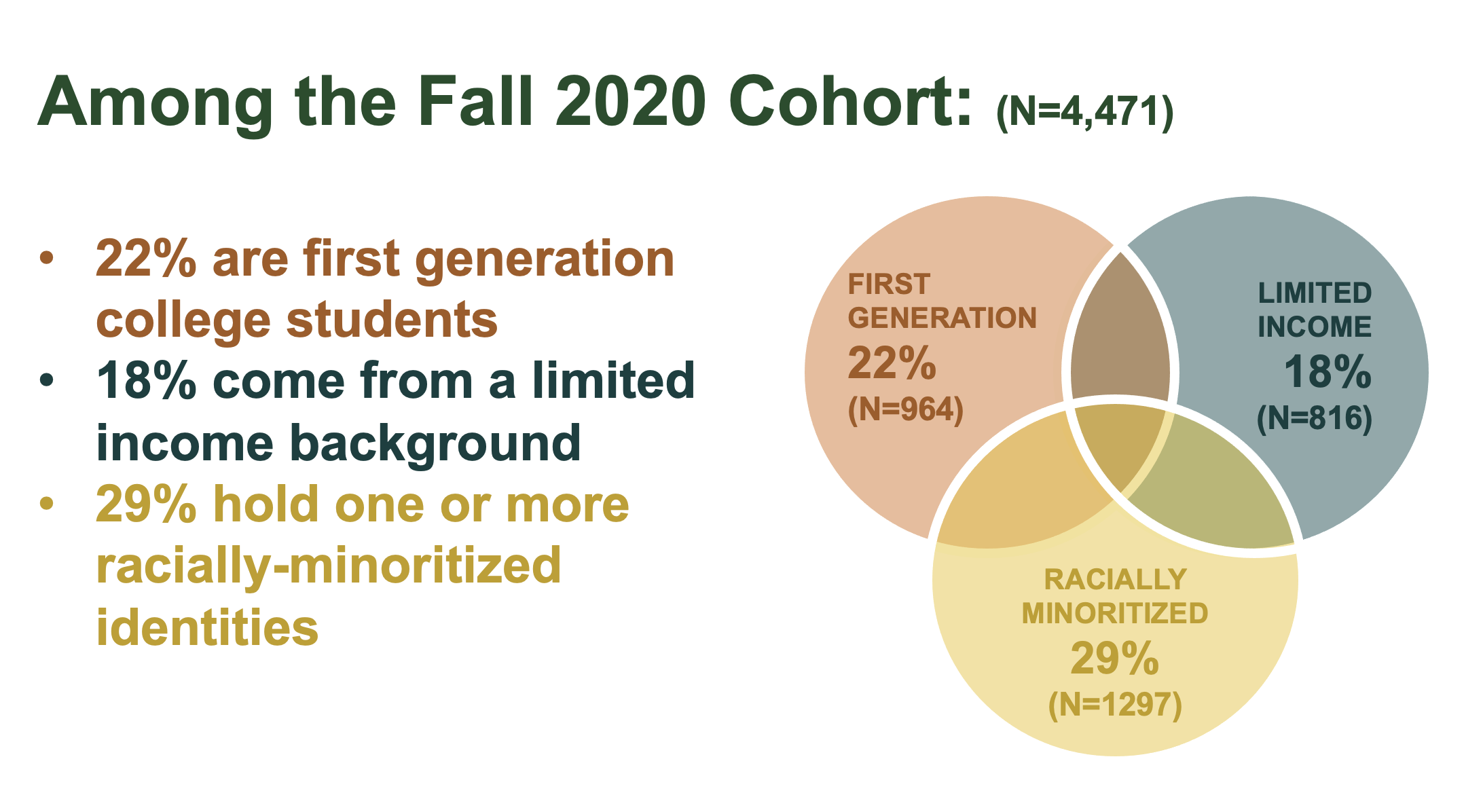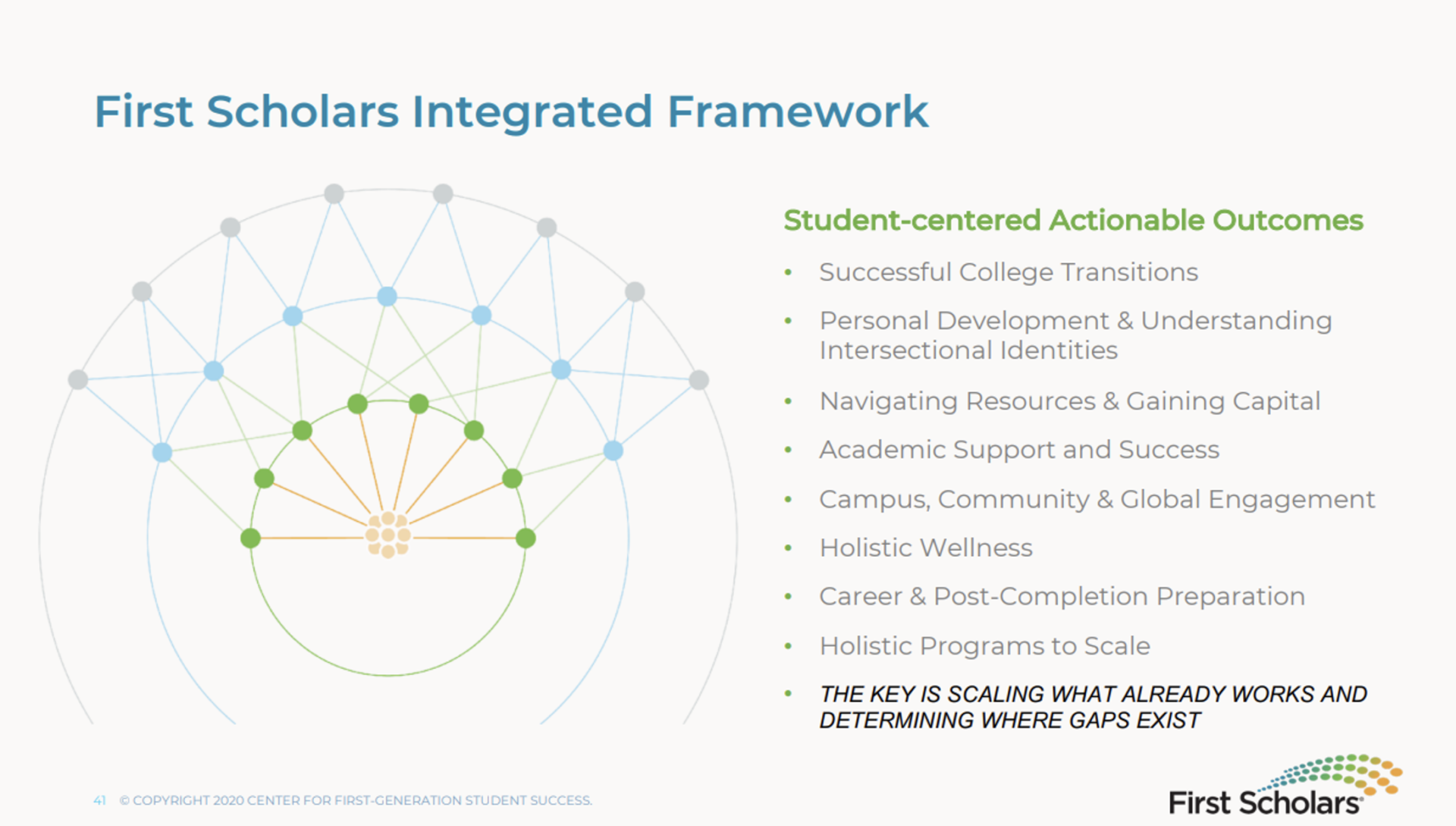Editor’s note: In 2020, leaders of the Colorado State University Race, Bias and Equity Initiative announced the selection of three proposal themes to support moving forward. After the announcement, each proposal team began working on their next steps, laying groundwork and shoring up plans for the road ahead. In the coming months, we will focus on the work and progress of each proposal team and share their goals and visions for the future. This first article examines the proposal to unify and strengthen support for first-generation students.
The Proposal
Unify and strengthen current First Generation initiatives, including research, scholarships, committees and countless individuals dedicated to guiding and supporting these students, to transform CSU by centering first-generation, limited income, and racially or ethnically minoritized students.
Diverse backgrounds, one shared experience
First-generation students come from a variety of backgrounds and circumstances, but one thing they have in common is the shared experience of being the first in their families to navigate higher education. This creates unique opportunities and challenges for students, faculty and staff, and requires a holistic set of resources and a cultural shift to meet these needs.
After the announcement of the proposal’s selection, University community members were curious about the link between the proposal and race. While the Race, Bias and Equity Initiative has assumed a broad, intersectional approach to its work, the question remained: Who and how will this approach help?
Special funding for First Gen students
On Jan. 27, the First Generation University Initiative steering committee voted to pass along a $15,000 funding line, originally granted by the Race, Bias and Equity Initiative, to directly support first-generation students. The allocation will be matched by the Student Success Initiatives in the Provost’s Office. The combined $30,000 will be awarded to first-generation students through continuation and completion grants and financial aid packages as identified by the Office of Financial Aid.
Data from CSU’s Institutional Research, Planning and Effectiveness’s Interactive Reporting tool help to answer this question. In Spring 2020, there were a total of 5,507 undergraduate students who identified as First Generation. Of those, 47% self-identified as being from a racially minoritized background, which encompasses both race and ethnicity. Over half of all undergraduate students who identify as Hispanic and/or Latinx are also First Gen (53%); and among undergraduate students who identify as Black and/or African American, just under half are First Gen (44%).

The incoming student population also proves how critical it is to take an intersectional approach. Among the Fall 2020 cohort of first-year students, 22% are first-generation, 18% come from a limited income background, and 29% hold one or more racially minoritized identities. Of the 4,471 first-year students, 44% identify with at least one of three attributes (first-generation, racially minoritized, or limited income) and 41% of those students identify with at least two or more attributes.
By intentionally centering first-generation, limited income, and racially or ethnically minoritized students, a systemic collaborative approach allows Colorado State University to better serve all students through a truly inclusive model. This evidence-based approach could allow CSU to better achieve its mission of access and service to the state of Colorado through a lived experience for students, especially students with multiple minoritized identities.
Building upon the work of others
First-generation student success is, quite simply, part of CSU’s DNA. In 1984, thanks to a determined push from the Board of Governors, faculty and staff, CSU became the first university in the country to identify first-generation, limited income students in Colorado and provide scholarships designed to pay for their tuition and student fees.
This work continued and coalesced in 2009 through the formation of the First Generation University Initiative. The work of this initiative created a solid foundation to build upon for the Race, Bias and Equity Initiative proposal, which is a collaboration of the Office of the Vice President for Diversity, Enrollment and Access, the Division of Student Affairs and the Provost’s Office.
As the University moves into the future, it will be critical to coordinate the efforts of these divisions in a comprehensive structure. The key is to reform existing policies and practices to best serve first-generation students, and to institute systemic change that grounds CSU’s education model in the success of its students from increasingly diverse backgrounds.
First Scholars and the Center for First-Generation Student Success
Exciting steps have been taken in the quest to shore up the various First Gen resources at CSU. While the ultimate goal is to open a First Generation Center at CSU, budget constraints caused by the COVID-19 pandemic have called for more creative approaches in the immediate future.

One exciting development is CSU’s partnership with the national Center for First-Generation Student Success at NASPA – Student Affairs Administrators in Higher Education – and its First Scholars program. An initiative of the First Scholars program is “an ecosystem of processes, tools and guidance” accessible to member institutions. First Scholars grounds its work in evidence-based approaches and higher education scholarship to make available tools and resources that are practical and proven to aid in first-generation students’ success.
Shannon Archibeque-Engle, assistant vice president for diversity, currently chairs the First Generation University Initiative and has been working closely with Steve Dandaneau, executive director of the Reinvention Collaborative and associate provost, and Ryan Barone, assistant vice president for student success. These three leaders serve as the official representatives to NASPA for CSU’s First Scholars efforts and work together with a larger network of individuals across the University.
“The work to systemically center support for first-generation, limited income, and racially or ethnically minoritized students is the work necessary to achieve our mission of access and excellence as a land-grant institution,” Archibeque-Engle said.
Next steps for First Scholars

With the signing of the NASPA and First Scholars agreement by CSU President Joyce McConnell in 2020, the partnership is now underway. The work group is undertaking an Insights Tool survey, one of the guiding resources provided by NASPA, to gather feedback and information from University leaders and staff on embedded First Gen efforts in their departments. The survey was distributed in the Fall 2020 semester and responses were due in January. NASPA will return the data to CSU in a comprehensive report in April.
An additional area of focus has been formation of a First Generation steering committee. With input from the First Scholars resources, as well as feedback from previous members of the First Generation University Initiative, strategic members have been identified and invitations for the new committee were extended, with the first meeting held on Jan. 27.
Future actions for the work team and steering committee include an analysis of the Insights Tool data report to formulate next steps, creation of a mini-grant proposal process, and collaboration with upcoming NASPA First Generation student success conferences and First Scholars national meetings.